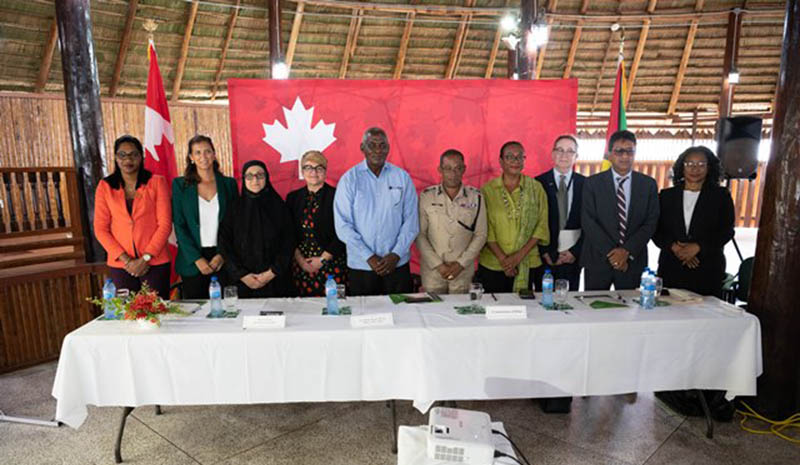With funding from Canada, a new project spearheaded by the Justice Education Society was yesterday launched with the aim of strengthening access to justice for women, girls and Indigenous peoples.
The four-year project, was launched at the Umana Yana in Kingston, Georgetown, will focus on building the technical capacity of justice actors to respond to sexual and gender-based violence targeting women and girls through training and assistance to the Guyana Police Force, the Director of Public Prosecutions and the judiciary, as well as remote Indigenous populations, where lack of access to justice is a principal concern, especially for women and girls.
A pilot of the project will be rolled out with the aim of building the capacity of Indigenous women and leaders through the National Toshaos’ Council, women’s groups, and civil society organisations. Through the pilot phase the project will look at coordinating and strengthening remote police detachments, delivering gender transformative and rights-based public legal education to support women and girls.
It is being funded by the Canadian Government’s Global Affairs Department in collaboration with the Canadian High Commission in Guyana.
Although the cost of the project was previously disclosed by the High Commission, it stated yesterday that there will be a ministerial announcement of the project in Canada, at which time the dollar value would be officially publicized here.
Presenting an overview of the project objectives and ambition, Country Representative and Project Director, Lisa Thompson said that not only is the programme focused on the psychosocial aspects of working women and girls, but also on building the technical skills of the Guyana Police Force.
She explained that the project has a survivor approach and is focused on working directly with survivors and what their needs are.
“What it is that works best for them and what it is that does not work them and then working in a manner that is respectful… so working with the police to find out what are the areas in which we can support them that will be the most impactful, working with civil society partners to find out what are the areas in which we can be most impactful,” she outlined.
While the project is heavily focused on women and girls, she said they will also work with male survivors of sexual and gender-based violence.
During the life of the project, it is their aim to work with 10,000 to 12,000 persons, with a major focus in Indigenous communities. The project will commence in Region One, which they have identified to be troubled and in need of outlined services.
While acknowledging that the project has ambitious goals, Thompson explained, “We have our ultimate outcome—it is increased realisation of rights to inclusive, quality, and gender-responsive justice for women, girls and indigenous victims of sexual and gender-based violence in Guyana.”
Meanwhile, Minister of Home Affairs, Robeson Benn, in his brief address at the launch, stressed that the partnership is welcomed at this time. He assured that the Guyana Police Force and all other agencies will align with his ministry to work towards the objective of the programme.
Benn said the group identified for the project “have the most precarious lives in Guyana at the moment.”
“The women, suffering from gender-based violence, and the Indigenous people, who are more impacted by poverty, and lack access to these services to improve their lives and livelihood. Therefore, this partnership is particularly [welcomed] at this time,” he expanded.
“…this effort particularly in relation to strengthening justice for women girls and Indigenous people will go a far along the way towards bringing us to a position… on increasing the peace in Guyana… we don’t intend to increase peace by utilizing the strong arm of the law…,” he pointed out, before stating that the country requires a big change in policing, a big change in attitude, and a big change totally in the culture of the society.
He expressed optimism that the project will be rolled out across the country to benefit all communities.
Canadian High Commissioner Mark Berman in his address to the gathering said that the launching of such a project cross cuts three areas of critical importance to the government of Guyana. These are Indigenous welfare, sexual and gender-based violence, and access to justice for the most vulnerable and marginalised in society.
He noted that “True equality will not be possible until everyone, regardless of their place in society, is able to access full and equal protection under the law,”
Berman said it is his hope that at the conclusion of the project it will deliver meaningful and tangible results, which will serve to improve the welfare of Indigenous Guyanese and by extension strengthen the system for all Guyanese.
He stated that Canada is deeply committed to advancing the rights, perspective and prosperity of Indigenous people at home and across the world.
Berman while highlighting the numerous programmes and initiatives Guyana has benefitted from through the Canadian government, acknowledged that Canada remains a partner in the development of the country.
The launch of the project was also attended by acting Chief Justice Roxane George, Director of Public Prosecution Shalimar Ali-Hack, Minister of Legal Affairs and Attorney General Anil Nandlall, and (Ag) acting Police Commissioner Clifton Hicken, among others.









